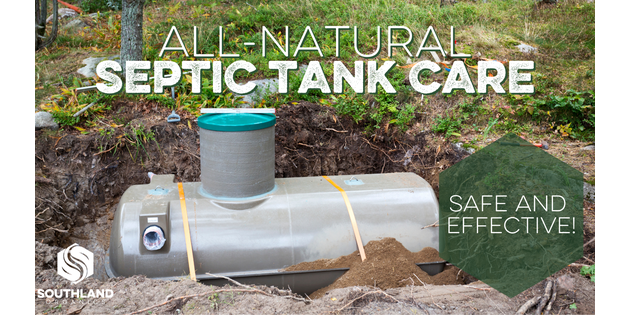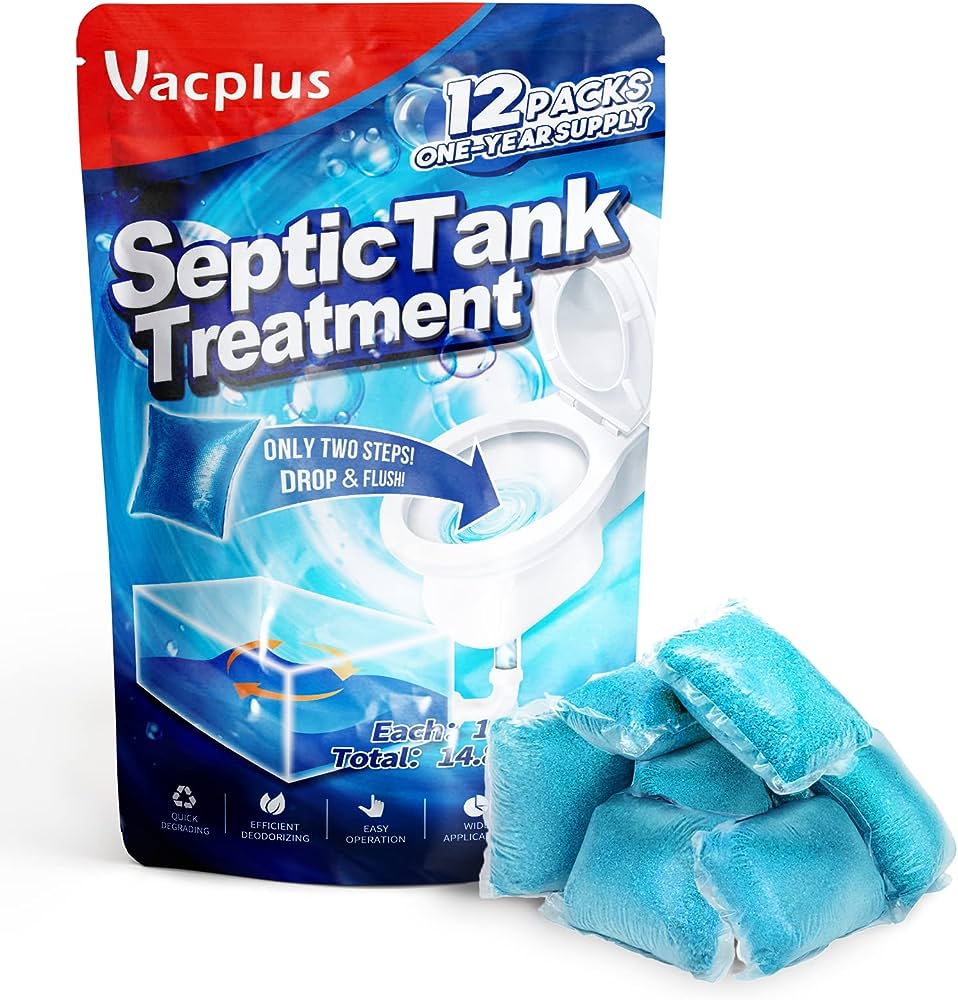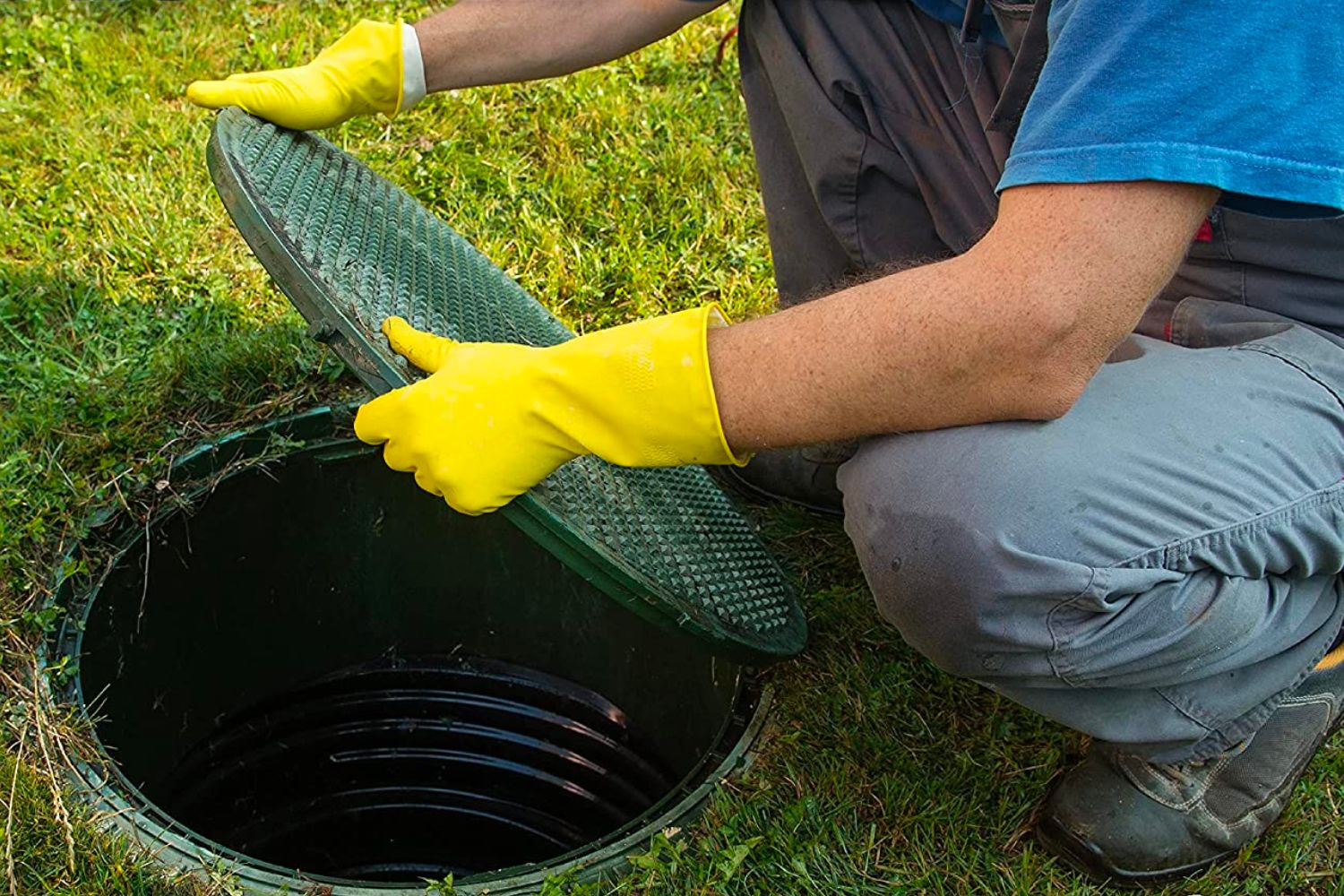In this article, you’ll discover the best septic tank treatments to ensure a healthy and efficient system. Maintaining your septic tank is essential for avoiding costly repairs and preserving the longevity of your system. We’ll explore the top solutions that can tackle common septic tank issues, such as clogs and odors, providing you with practical advice to keep your septic system running smoothly. With the right treatment, you can enjoy peace of mind knowing that your septic tank is well taken care of.

Understanding Septic Tank Systems
If you own a property with a septic tank system, it’s important to have a good understanding of how these systems work and the common issues that can arise. Septic tank systems are self-contained wastewater treatment systems that are commonly used in areas that don’t have access to a centralized sewage system.
How septic tank systems work
Septic tank systems operate by separating solid waste from the wastewater that flows into the tank. The solid waste settles at the bottom of the tank, forming a layer of sludge, while the lighter materials, such as grease and oil, float to the top to create a layer of scum. The liquid wastewater, known as effluent, is then discharged into the drain field, where it percolates through the soil and is treated naturally.
Common issues with septic tank systems
Septic tank systems can encounter a range of issues if not properly maintained. One common issue is the accumulation of too much sludge or scum, which can result in clogged pipes and drains, foul odors, and even sewage backups. Another issue is the failure to properly maintain the drain field, which can lead to the groundwater becoming contaminated with harmful bacteria and pathogens. Additionally, a septic tank system may experience problems if household items like non-biodegradable or chemical-laden substances are flushed down the toilet or poured down the drains.
Importance of proper septic tank maintenance
Proper maintenance of your septic tank system is crucial to ensuring its optimal functioning and longevity. Regular inspection and pumping of the septic tank are essential to remove accumulated solids and prevent potential clogs and backups. It’s also important to be mindful of what you flush down the toilet or pour down the drains to avoid damaging the system. A well-maintained septic tank system not only prevents costly repairs but also helps protect the environment by ensuring that wastewater is properly treated.
Factors to Consider when Choosing a Septic Tank Treatment
When it comes to choosing a septic tank treatment, there are several factors to consider to ensure that you select the right product for your system.
Safe for the environment
One of the most important factors to consider is the environmental impact of the septic tank treatment. Look for treatments that are biodegradable and environmentally friendly, as these products minimize the release of harmful chemicals into the soil and groundwater.
Compatibility with septic tank systems
Not all septic tank treatments are suitable for every type of system. It’s essential to choose a treatment that is specifically formulated for septic tank systems to ensure compatibility and effectiveness.
Effectiveness against common septic tank problems
Different septic tank treatments target specific issues, such as odor control, sludge digestion, or clog prevention. Consider the specific problems you want to address and choose a treatment that is known for effectively combating those issues.
Ease of use
Choosing a septic tank treatment that is easy to use can make maintenance simpler and more convenient. Look for treatments that come with clear instructions and require minimal effort to apply.
Long-term benefits
Consider the long-term benefits of a septic tank treatment. Some products offer ongoing maintenance and protection, reducing the need for frequent pumping and repairs. Assess the potential savings and benefits that a treatment can provide in the long run.
Top Septic Tank Treatments
Now that we have a good understanding of the factors to consider, let’s explore some of the top septic tank treatments available in the market today.
Bacterial-based treatments
Bacterial-based septic tank treatments introduce beneficial bacteria into the system, which helps break down solid waste and maintain a healthy balance of bacteria in the tank. These treatments are considered natural and environmentally friendly.
Enzyme-based treatments
Enzyme-based treatments use enzymes to break down organic matter in the septic tank, promoting the decomposition of waste and preventing clogs and backups. These treatments are particularly effective in breaking down grease and other difficult-to-digest substances.
Chemical treatments
Chemical treatments often utilize strong chemicals to kill off harmful bacteria and eliminate odors in the septic tank. While they can provide quick results, it’s essential to ensure that the chemicals used are safe for the environment and won’t harm the septic tank system’s delicate balance.
Natural and eco-friendly treatments
Natural and eco-friendly treatments, such as using baking soda or vinegar, provide a gentler alternative for septic tank maintenance. These treatments are often less potent but can still be effective in maintaining a healthy septic tank system.
Bacterial-based Treatments
Bacterial-based treatments have gained popularity among homeowners with septic tank systems due to their natural and environmentally friendly characteristics. Understanding how these treatments work and their benefits can help you make an informed decision.
How bacterial-based treatments work
Bacterial-based septic tank treatments introduce beneficial bacteria, often called “good bacteria,” into the septic tank. These bacteria are responsible for breaking down organic matter and converting it into harmless byproducts such as carbon dioxide and water. By enhancing the natural decomposition process, bacterial-based treatments can reduce the accumulation of sludge and scum, prevent clogs, and help maintain a healthy balance of bacteria in the tank.
Benefits of bacterial-based treatments
One of the notable benefits of bacterial-based treatments is their environmentally friendly nature. These treatments use non-toxic bacteria that occur naturally in the environment, reducing the impact on the soil and groundwater. Bacterial-based treatments are also relatively easy to use, often requiring regular application according to the product’s instructions. They can improve the overall efficiency of the septic tank system, reducing the need for frequent pumping and minimizing the risk of costly repairs.
Popular bacterial-based septic tank treatments in the market
There are numerous bacterial-based septic tank treatments available in the market. Some popular options include Brand A, a highly rated treatment that utilizes a blend of specially selected bacteria strains to enhance waste digestion, and Brand B, which focuses on preventing drain field clogs and odors by introducing bacteria that break down solids and eliminate sulfur compounds.

Enzyme-based Treatments
Enzyme-based septic tank treatments are another popular choice for homeowners looking to maintain the health and efficiency of their septic tank system. Let’s delve into how these treatments work and the benefits they offer.
How enzyme-based treatments work
Enzymes are naturally occurring proteins that act as catalysts in various biological processes, including the breakdown of organic matter. Enzyme-based septic tank treatments use specifically formulated enzymes that target the types of waste commonly found in septic systems. These enzymes work by accelerating the decomposition process, making it easier for bacteria to break down organic matter and prevent the formation of clogs and backups.
Benefits of enzyme-based treatments
Enzyme-based treatments offer several benefits for septic tank systems. They help break down difficult-to-digest substances like grease and oil, ensuring that the system remains free from blockages. These treatments also help maintain a healthy balance of bacteria in the septic tank, ensuring efficient waste digestion. Enzyme-based treatments are often highly concentrated, meaning that a small amount can go a long way in providing ongoing maintenance and protection for your septic tank system.
Popular enzyme-based septic tank treatments in the market
In the market, you can find several effective enzyme-based treatments for septic tank systems. Brand C is a well-known product that utilizes a blend of enzymes and bacteria to enhance the breakdown of organic matter and reduce the buildup of sludge and scum. Brand D is another popular option, focusing on targeting specific types of waste, such as proteins and carbohydrates, to maintain a clean and efficient septic tank system.
Chemical Treatments
Chemical treatments for septic tanks are often considered a more aggressive option. While they can offer quick results in terms of odor control and bacteria elimination, it’s important to understand how they work and the potential drawbacks associated with their use.
How chemical treatments work
Chemical treatments typically utilize strong chemicals, such as chlorine bleach or hydrogen peroxide, to kill off harmful bacteria in the septic tank. These treatments often come in the form of powders or liquids that are applied directly to the tank. The chemicals work quickly to eradicate odor-causing bacteria, providing temporary relief from unpleasant smells.
Benefits of chemical treatments
One of the main advantages of chemical treatments is their immediate effectiveness in controlling odors and eliminating harmful bacteria. They can provide a quick fix for septic tank issues and may be suitable for situations where immediate odor control is necessary. Some chemical treatments also come with additives that help break down sludge and scum, enhancing the overall efficiency of the septic tank system.
Potential drawbacks of chemical treatments
While chemical treatments can offer immediate results, there are potential drawbacks to consider. The use of strong chemicals can disrupt the delicate balance of bacteria in the septic tank, potentially leading to a decrease in the system’s overall efficiency. Some chemicals may also be harmful to the environment, septic tank components, or the drain field if used improperly. It’s crucial to carefully follow the instructions provided by the manufacturer and ensure that the chemicals are safe for use in your specific septic tank system.
Popular chemical septic tank treatments in the market
If you opt for a chemical-based septic tank treatment, it’s advisable to choose a reputable product that has been proven effective and safe for use. Brand E is a well-known chemical treatment that combines strong disinfecting agents with enzymes to provide odor control and break down organic matter. Brand F is another popular option, offering a range of chemically-based additives designed to target specific septic tank issues and promote overall system health.

Natural and Eco-friendly Treatments
For those seeking a more natural and eco-friendly approach to septic tank maintenance, there are options available that utilize environmentally friendly ingredients. Let’s explore how these treatments work and the benefits they offer.
How natural and eco-friendly treatments work
Natural and eco-friendly septic tank treatments often rely on ingredients like baking soda, vinegar, or special bacterial blends to provide ongoing maintenance and support for the septic tank system. Baking soda and vinegar are known for their cleaning and deodorizing properties and can help maintain a healthy pH balance in the tank. Bacterial blends, similar to those used in bacterial-based treatments, help break down organic matter and promote efficient waste digestion.
Benefits of natural and eco-friendly treatments
One of the main benefits of natural and eco-friendly treatments is their minimal impact on the environment. These treatments use non-toxic, biodegradable ingredients, which means they won’t introduce harmful chemicals into the soil or groundwater. Natural treatments are often gentle yet effective, providing ongoing maintenance and reducing the risk of clogs and backups. They offer a safe and eco-conscious alternative to more aggressive chemical treatments.
Popular natural and eco-friendly septic tank treatments in the market
If you prefer a natural and eco-friendly approach to septic tank maintenance, several products are worth considering. Brand G offers a range of natural treatments that incorporate baking soda and vinegar to promote a healthy septic tank system. Brand H focuses on utilizing specialized bacterial blends derived from natural sources to enhance waste digestion and reduce the accumulation of sludge and scum.
Dos and Don’ts of Septic Tank Treatment
To ensure the health and longevity of your septic tank system, it’s important to adhere to certain dos and don’ts when it comes to septic tank treatment.
Dos for maintaining a healthy septic tank system
- DO have your septic tank inspected and pumped regularly to remove accumulated solids and maintain optimal functioning.
- DO use septic tank treatments that are specifically formulated for septic tank systems to ensure compatibility and effectiveness.
- DO follow the instructions provided by the manufacturer when applying septic tank treatments.
- DO conserve water by fixing leaky faucets, using efficient appliances, and practicing water-saving habits.
- DO divert surface water away from the drain field to prevent oversaturation and potential system failure.
Don’ts that can harm your septic tank system
- DON’T flush non-biodegradable items like wipes, diapers, or cigarette butts down the toilet.
- DON’T pour grease, oil, or harsh chemicals down the drains, as these can clog the system or disrupt the natural balance of bacteria.
- DON’T overload the septic system by doing multiple loads of laundry or running major water-consuming appliances simultaneously.
- DON’T drive or park vehicles or heavy machinery over the drain field, as the weight can damage the system and compact the soil.
Proper disposal of septic tank treatment products
When disposing of septic tank treatment products, it’s important to follow recommended guidelines to protect the environment and prevent contamination. Read the product labels for specific disposal instructions, as some treatments may need to be diluted or neutralized before disposal. Avoid dumping septic tank treatment products directly into storm drains, as they can ultimately end up in rivers, streams, or other bodies of water.

Tips for Choosing the Best Septic Tank Treatment
With numerous septic tank treatment options available in the market, choosing the best one for your specific needs can be daunting. Here are some tips to help you make an informed decision:
Research the product and read reviews
Before purchasing a septic tank treatment, take the time to research the product and read reviews from other homeowners who have used it. Look for unbiased reviews from reputable sources to get a clearer understanding of the product’s effectiveness and whether it meets your specific needs.
Consult with septic system professionals
When in doubt, it’s always a good idea to consult with septic system professionals, such as plumbers or septic tank service providers. They can offer expert advice tailored to your unique septic tank system and recommend suitable treatment options based on their experience and knowledge.
Consider the specific needs of your septic tank system
Different septic tank systems may have different requirements and issues. Consider the specific needs of your system, such as odor control, sludge reduction, or drain field maintenance, when choosing a treatment. Select a product that addresses your system’s specific needs to ensure optimal results.
Look for certifications or endorsements
Certifications or endorsements from reputable organizations can provide additional assurance about the quality and effectiveness of a septic tank treatment. Look for products that have been tested and approved by organizations specializing in wastewater treatment or environmental protection.
Frequently Asked Questions about Septic Tank Treatments
To address common queries about septic tank treatments, here are answers to some frequently asked questions:
Can septic tank treatments fix major septic tank issues?
While septic tank treatments can be effective in maintaining a healthy septic tank system and preventing common issues, they may not be able to fix major septic tank problems on their own. If you are experiencing major issues, such as persistent clogs, foul odors, or sewage backups, it’s important to consult with septic system professionals who can assess the situation and recommend appropriate solutions.
How often should septic tank treatments be used?
The frequency of septic tank treatment usage can vary depending on the specific product and the condition of your septic tank system. It’s advisable to follow the instructions provided by the manufacturer regarding the application frequency. In general, regular maintenance treatments every few months are recommended to ensure ongoing protection and efficiency.
Are there any septic tank treatments to avoid?
While there are many reputable septic tank treatments available, it’s important to exercise caution and avoid treatments that make exaggerated claims or lack proper certifications. Avoid using products that contain harmful chemicals or have a negative impact on the environment. It’s also advisable to stay away from treatments that promise quick fixes for major septic tank issues, as these issues typically require professional intervention.
Can septic tank treatments replace regular pumping?
No, septic tank treatments cannot replace the need for regular pumping. Pumping is necessary to remove accumulated solids, such as sludge and scum, from the septic tank. Septic tank treatments complement regular pumping by promoting ongoing maintenance and preventing issues like clogs and odors. Regular pumping should still be scheduled according to the recommendations of septic system professionals to ensure optimal tank performance.
In conclusion, choosing the right septic tank treatment is essential for maintaining a healthy and efficient system. Consider factors such as environmental safety, compatibility, effectiveness, ease of use, and long-term benefits when selecting a treatment. Assess the advantages and disadvantages of different types of treatments, such as bacterial-based, enzyme-based, chemical-based, and natural eco-friendly options. Adhere to dos and don’ts to maintain a healthy septic tank system and properly dispose of septic tank treatment products. Take into account expert advice, read product reviews, and consider the specific needs of your septic tank system. By doing so, you can ensure that your septic tank remains in optimal condition, minimizing the risk of costly repairs and protecting the environment.

